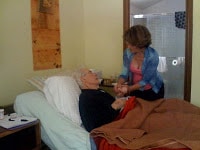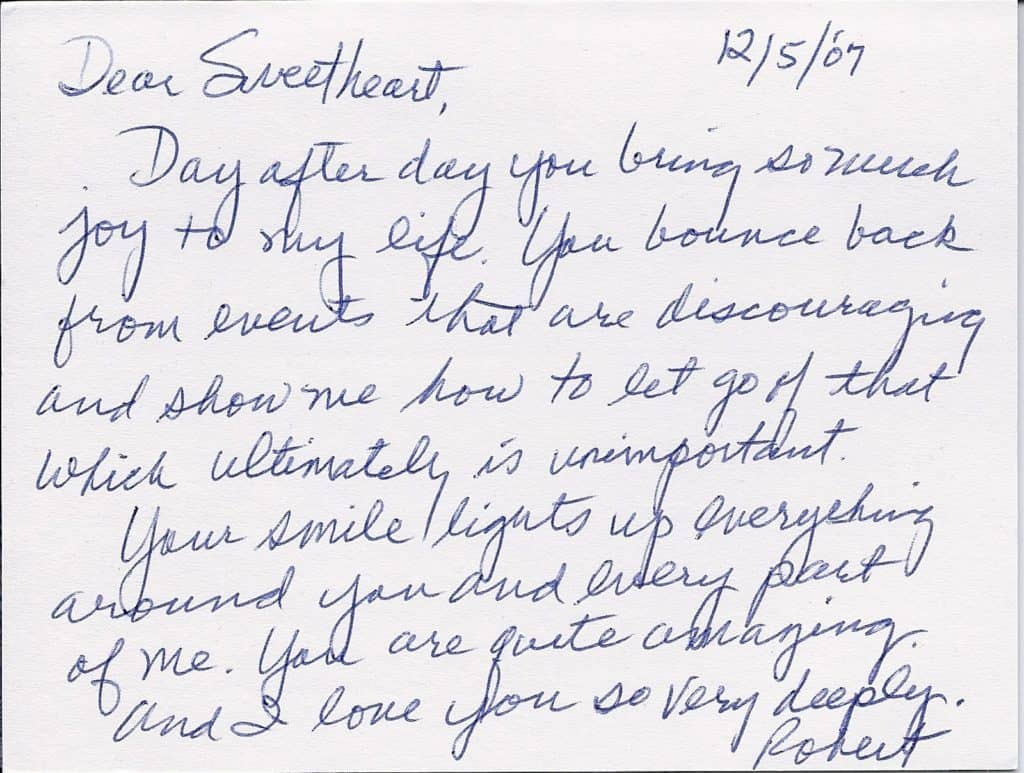Posts Tagged ‘grief’
“I’m Going to Make You Coffee….”
If you ask me if I still miss Robert, two years after his death, I answer, “Only when I breathe in or out.”
I still start each morning recapturing a memory. Today it was the way he opened his ocean-blue eyes in the morning and smiled, his face melting with love. “Let’s snuggle,” he would say. Then one of us would decide, “I’ll snuggle you,” and we would shift to our sides, the snuggler wrapped around the back of the snuglee.
I loved when Robert snuggled me, enveloping me, so close that we couldn’t tell where he ended and I began, if indeed there was a distinction. I would take his hand in both of mine, push my nose into his palm, and inhale deeply. His palm smelled of sleep, a warm, enticing smell that was totally Robert. I can still smell his hand, still taste his skin as I kissed him everywhere my mouth would reach.
 Other mornings he woke ready to meet the day, his garden or art studio beckoning, no time for snuggling. He announced, “I’m going to make you coffee,” and I always responded, “I love it when you make me coffee.” He padded out to the kitchen to grind beans, boil water, and arrange the filter cone over a metal coffee pot that had journeyed with him for decades.
Other mornings he woke ready to meet the day, his garden or art studio beckoning, no time for snuggling. He announced, “I’m going to make you coffee,” and I always responded, “I love it when you make me coffee.” He padded out to the kitchen to grind beans, boil water, and arrange the filter cone over a metal coffee pot that had journeyed with him for decades. The “make you coffee” ritual started early in our seven-year love affair, and persisted wherever we were, home or hotel, and whatever else was happening in our lives. Towards the end, when his body started succumbing to cancer, he told me, “As long as I can make you coffee in the morning, I know I’ll be all right.”
Then one morning, he tried to get up, and he couldn’t. He stumbled, his legs trembling, his back stabbing with pain, his brain unable to emerge from sleep. He sat back on the bed. “I can’t do it,” he told me, and we both cried, as I’m crying now, remembering the day that everything changed.
…Now I make my own coffee in his special coffee pot and carry it to the living room where I’m surrounded by Robert’s paintings. I write memories in my journal—snippets of sweet conversation, playful games we invented, afternoons that turned into evening as we made love as if life depended on it. Maybe it did.
 Even though I write for a living, using a computer and all the tech tools available to me, I write my memory journal in longhand. Somehow writing longhand comes from the heart more than the brain, and I rediscover memories I had forgotten.
Even though I write for a living, using a computer and all the tech tools available to me, I write my memory journal in longhand. Somehow writing longhand comes from the heart more than the brain, and I rediscover memories I had forgotten.  My hand lingers over the page, and I picture Robert’s hand –the artist’s hand making love to the canvas, the gardener’s hand making love to the dirt, the dancer’s hand making love to the music, and my lover’s hand–making love to me.
My hand lingers over the page, and I picture Robert’s hand –the artist’s hand making love to the canvas, the gardener’s hand making love to the dirt, the dancer’s hand making love to the music, and my lover’s hand–making love to me. What does matter, at this point in my life, is that I’m taking with me the best of what Robert and I shared. That’s what he’d want for me, and what I want for myself. I find joy in my writing, in dance, in close friends, in physical and mental exercise, in learning, and yes, in my memories of Robert.
I hold my coffee cup to my cheek. It’s just the right temperature.
His heart was beating under my hand
I had a beautiful dream about Robert, and as I approach the second anniversary of losing him, I keep rerunning the dream in my mind.
In the dream, I awoke to the sound of a song playing in my living room. I went down the steps, and there was Robert dancing! He was spinning so fast that he was almost a blur. He was dancing as he must have danced as a young man, before I knew him, when he was studying ballet and modern dance. I watched with love and amazement.
He slowed his spinning, then stopped and smiled at me, that tender smile that filled his eyes with softness. I put my hand on his chest, hot and moist from his exertion. Then the most wonderful part of the whole dream: I felt his heart beating under my hand!
So many times in our seven years together (exactly, from first kiss to last), I rested my hand on his beating heart. It was always the first place I touched when we came together. It was where my hand rested when we snuggled after making love. I loved his fuzzy chest hair–the touch and smell and heat of it–and I loved his beating heart.
Missing Robert
I’m trying to work on my book, but as my birthday approaches, I miss Robert so horribly that I had to write memories of him. Excerpts:
I cried with Robert when we were forced to accept his death. His mind stayed strong at first as his body weakened. While he still had the strength, he prepared with the care and organization that he always ran his life. He got his affairs in order and cleaned out his files and his painting studio. He gave away thousands of dollars worth of art supplies to an art program for developmentally disabled adults. He made gifts to family and friends. He labeled files that I would need.
Multiple myeloma sapped his life from him while he still breathed. His back, broken in six places, caused him brutal pain. One day he drew the pain to show me. His drawing was so raw, so anguished, so horrible in its detail, that I wail aloud picturing it. I am tempted to share it with you here, but I won’t, because you could never forget it.
It wasn’t until Robert entered hospice care that he was able to be at peace, out of pain, and a loving man again. I owe a great debt of gratitude to hospice, who figured out how to medicate him properly and counseled him with great respect and warmth. They also gave me the bereavement support and counseling that enabled me to preserve what was left of my sanity.
Robert’s last ten days were spent in bed, journeying in and out of consciousness. Sometimes he woke startlingly lucid and sweet, sharing memories and words of love. Often he was only semi-awake, seeming to have one foot in our world and one foot in another. His comments were occasionally hilariously funny – he saw our line dance class dancing with llamas on a stage in front of us, for example, or he plucked flying books from the air for his granddaughter Megan, an avid reader, to attach to her eyes — though he didn’t know why we were laughing.
Sometimes he slept for days, and I thought I’d never hear his voice again.
One day I was crying in my study, listening to his breathing on the baby monitor that hospice recommended. “I wish I had my best friend, my darling Robert, to ask for help with this,” I sobbed.
Then it occurred to me: I still did. Perhaps the man in the bed was a shadow of the man he used to be, but he was still there. I went to the bedroom, where he lay, eyes closed, mouth slack. I took his limp hand and whispered, “Can you please help me for a minute?”
“Yes,” he said quietly, without opening his eyes.
“How will I go on without you?” I asked, resting my tear-streamed face on his chest as lightly as I could so I wouldn’t hurt him.
He stroked my hair slowly, a whisper of a touch, soft as a kiss. “You’ll be okay,” he told me. “Reach out to people.”
Now I do. I reach out to people I know, people I don’t know. I reach out to you.
First anniversary of Robert’s death
 “Will you be able to say goodbye when it’s time?” I asked Robert softly, holding his limp hand in both of mine.
“Will you be able to say goodbye when it’s time?” I asked Robert softly, holding his limp hand in both of mine.
I couldn’t tell if he was thinking about his answer, or drifting in and out of consciousness, or even if he had heard me.
“No,” he said finally, without opening his eyes.
It was a few days before Robert died last August 2, and we both knew he was close to the end. Hospice — such wonderful people! — kept him painfree as his bones deteriorated and his body processes shut down. He drifted between asleep (or unconscious) and half-awake, sometimes painting in the air with his fingers, sometimes thinking it was time to go to dance class or out to lunch (though he hadn’t been out of bed or eaten for a week), occasionally jumping into clarity for a few precious moments.
As Robert’s cancer progressed, I felt trapped in a nightmare that I couldn’t escape or rescue my beloved Robert, who was slipping away from me day by day, hour by hour.
Now, though, I am grateful that I was able to share this profound transition with him. I learned a lot about death that I never knew, never imagined. I also learned how love wins somehow, even at the end. Robert was rarely conscious over the last few days, but when he was, he murmured love to me.
Thank you, readers, for sharing with me the exhilaration and sensuality of our great love affair and far-too-short marriage. It feels right to share this part with you, too. 








